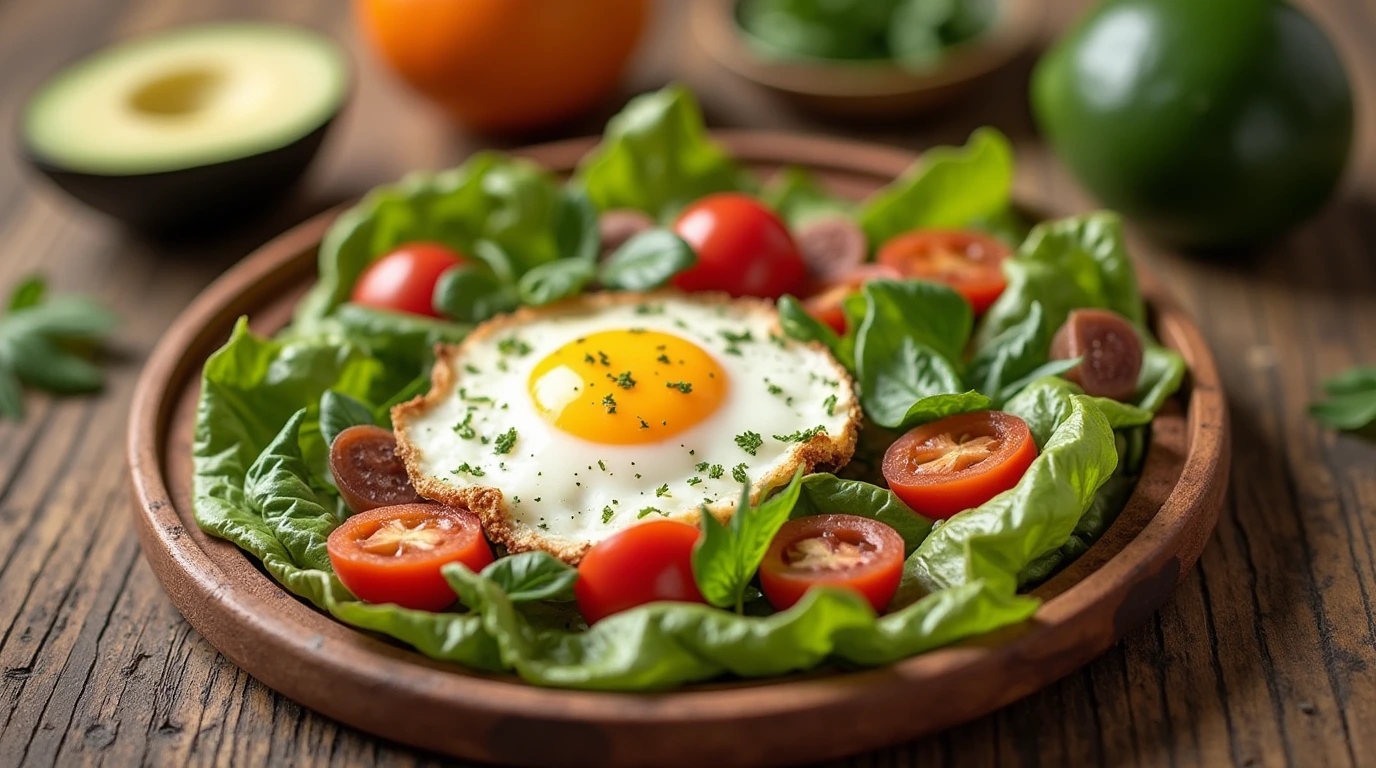Table of Contents
Boiling eggs and vegetables together is a smart way to cook. It saves time and energy. This guide will show you how to mix eggs and veggies in one pot. You’ll learn to make healthy, simple meals and use your kitchen better, so Can I boil egg and vegetables together?
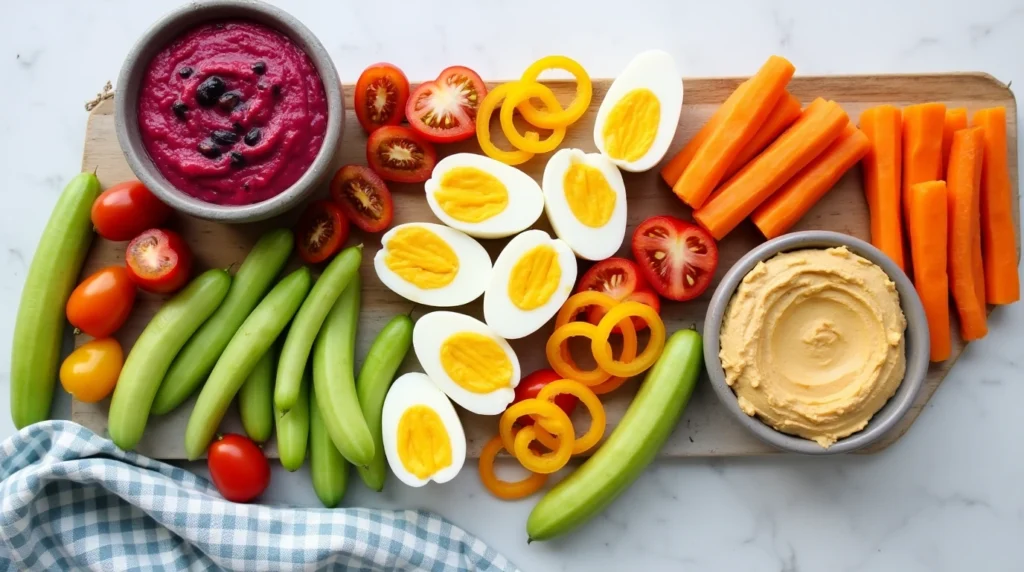
Key Takeaways
- Boiling eggs and vegetables together is a time-saving and energy-efficient cooking method.
- This technique allows for the creation of nutritious, easy-to-prepare meals.
- Properly combining eggs and vegetables in one pot can maximize the use of kitchen equipment.
- The guide provides a comprehensive overview of the benefits, techniques, and tips for successful one-pot boiling.
- Readers will learn how to achieve consistently perfect hard-boiled eggs and perfectly cooked vegetables.
Benefits of Combining Eggs and Vegetables in One Pot
Making a one-pot meal with eggs and vegetables is smart for busy cooks. It’s quick, easy, and healthy. This method saves time and boosts nutrition.
Time-Saving Advantages
By cooking eggs and veggies together, you save time. You don’t have to spend as much time in the kitchen. This lets you do other things or relax.
Nutritional Synergy
Eggs and veggies cooked together are more nutritious. The vitamins in veggies work better with the proteins in eggs. This makes your meal more nutritious and filling.
Energy Efficiency Benefits
Using one pot saves energy. It means less time and effort for you. Plus, it’s better for the planet by using less energy.
“Combining eggs and vegetables in a one-pot meal is a game-changer for busy home cooks. It’s a win-win – you save time and get a nutritious, delicious dish in the process.”
Essential Equipment for Perfect Egg and Vegetable Boiling
Boiling eggs and vegetables together is easy with the right tools. You’ll need a medium-sized pot, a slotted spoon, and a bowl for an ice bath. These items make the process smoother and help you get perfect results.
The pot should fit the eggs and vegetables without being too crowded. A pot of 3-4 quarts is usually the best size. It gives enough room for everything to cook evenly.
A slotted spoon is key for moving cooked eggs and vegetables to the ice bath. It stops them from cooking more. Choose a spoon with big holes to let water drain fast.
An ice bath is needed to cool the eggs and vegetables quickly. It keeps the egg yolks firm and the vegetables bright. Just fill a big bowl with ice water before you start boiling.
A timer is also crucial for cooking eggs and vegetables just right. Overcooked eggs and vegetables can be tough and lose their flavor. Knowing the exact cooking times is important.
With the right equipment, your boiled eggs and vegetables will always be perfect. They’ll have the right texture and taste. A little preparation and the right tools will help you make delicious meals.
“The right tools can make all the difference in the kitchen. Investing in a few key pieces of equipment for boiling eggs and vegetables can save you time, effort, and ensure consistently great results.”
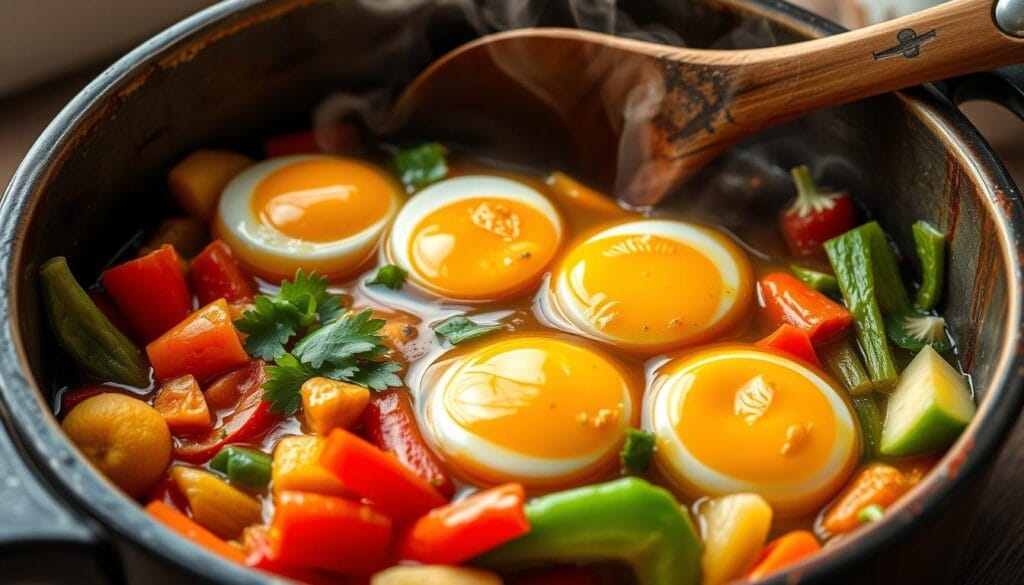
Can I boil egg and vegetables together?
Yes, you can boil eggs and vegetables together. It’s a quick and healthy way to make your meal. This method lets the flavors of eggs and veggies mix, making a tasty dish.
Best Vegetable Combinations
Great veggies to boil with eggs include spinach, broccoli, cherry tomatoes, and more. These foods are full of nutrients and taste great with eggs.
Timing Considerations
Timing is key when boiling eggs and veggies together. Some veggies, like potatoes, take longer to cook. Add delicate greens like spinach last. This way, everything cooks just right.
Safety Guidelines
- Make sure all food is cooked to a safe temperature.
- Keep food clean and safe during cooking.
- Don’t leave cooked food out too long to avoid bacteria.
By following these tips, boiling eggs and veggies together is easy and healthy. It’s perfect for quick meals like spinach with boiled eggs or trying new veggie mixes.
Perfect Hard-Boiled Egg Technique
Learning to cook perfect hard-boiled eggs is a big win. They’re great as a protein-rich snack or in a tasty veggie dish. The secret to perfect eggs is in a few easy steps.
- Begin with fresh eggs, a few days old. They peel better than very fresh ones.
- Put the eggs in a single layer in a saucepan. Cover them with cold water, making sure the water is an inch above the eggs.
- Heat the water to a rolling boil. Once boiling, turn off the heat and cover the pan with a lid.
- Let the eggs sit in the hot water for 9-12 minutes. Bigger eggs need more time.
- Drain the water and put the eggs in an ice bath. Let them cool for at least 14 minutes to stop cooking and make peeling easier.
Follow this method for hard-boiled eggs that are easy to peel and have a creamy yolk. They’re perfect for a healthy snack, breakfast, or adding to your veggie meals.
“The key to perfectly cooked hard-boiled eggs is all about timing and temperature control. With a little practice, you’ll be whipping up batches of hard-boiled eggs that are the envy of your friends and family.”
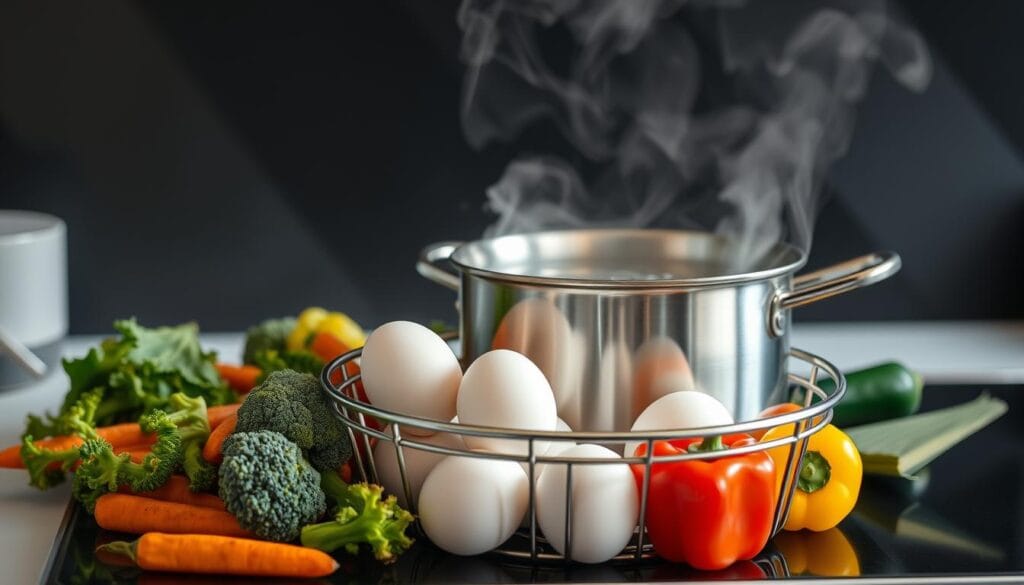
Selecting and Preparing Vegetables for Boiling
Choosing the right vegetables and preparing them well is crucial for great taste and texture. Pick fresh, high-quality veggies that are in season. Choose a variety of colors to get different nutrients.
Vegetable Cutting Techniques
Cutting veggies into uniform pieces helps them cook evenly. Use a sharp knife to cut them into bite-sized pieces. This way, all pieces cook at the same time, avoiding overcooking or undercooking.
Size and Portion Guidelines
- For root vegetables like potatoes, carrots, and beets, aim for 1-inch cubes.
- Leafy greens like spinach or kale can be left in larger chunks or roughly chopped.
- Broccoli and cauliflower florets should be cut into 1-inch pieces.
- Adjust portions based on the recipe and number of servings you’re preparing.
Pre-Boiling Preparation Steps
- Wash vegetables thoroughly under running water to remove any dirt or debris.
- Peel or trim off any inedible parts, such as stems, leaves, or tough skins.
- Consider blanching certain vegetables, like broccoli or green beans, before adding them to the pot with the eggs. This helps ensure they cook at the same rate.
By following these tips, you’ll make delicious and nutritious boiled dishes. They will perfectly complement your hard-boiled eggs.
Step-by-Step Cooking Process
Boiling eggs and vegetables together is quick and easy. Start by placing eggs in a single layer at the bottom of a large saucepan. Add enough cold water to cover the eggs by about 1 inch. Then, bring the water to a rolling boil over high heat.
Once boiling, remove the pot from the heat and cover it with a lid. Let the eggs sit in the hot water for 9 to 12 minutes. For soft yolks, cook for 2-4 minutes. For firmer yolks and whites, cook for 6-8 minutes. Fully set yolks and whites need 10-15 minutes.
While the eggs cook, prepare your vegetables. Choose a mix like broccoli, carrots, or green beans for a tasty one-pot meal. Cut the veggies into uniform sizes for even cooking. When the eggs are done, add the veggies to the pot and adjust cooking time as needed.
After the veggies are tender, move the pot to an ice bath. This stops the cooking and keeps the eggs and veggies perfect. It’s key to avoid overcooking and get a great one-pot meal.
By following this guide, you can make a delicious one-pot meal. It’s quick, saves energy, and is packed with nutrients. Enjoy your boiled eggs and veggies together!
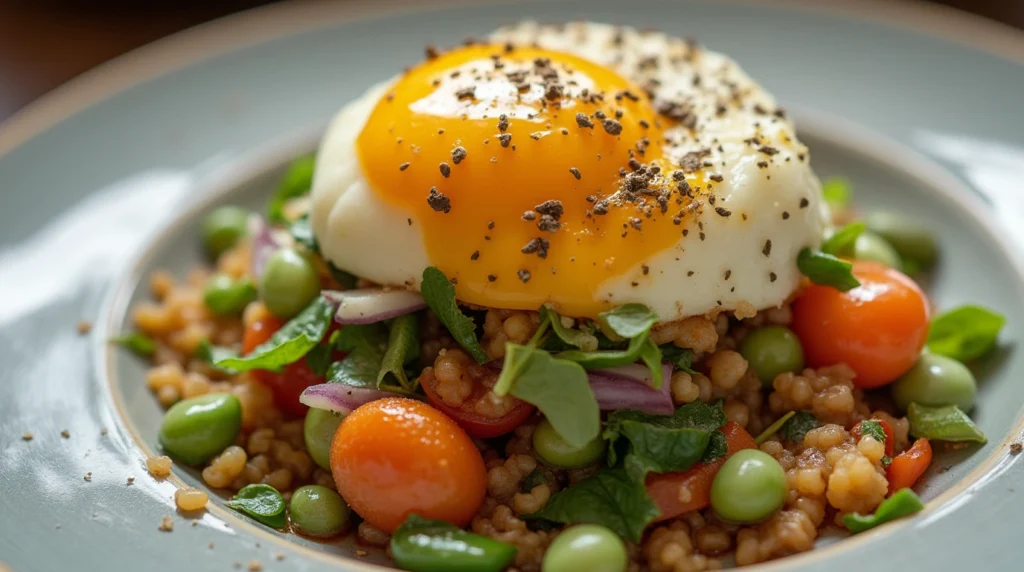
Storage and Meal Prep Tips
Storing your cooked eggs and vegetables right is key to keeping them fresh. We’ll look at cooling, storage, and meal prep tips. These will help you keep your kitchen work from going to waste.
Proper Cooling Methods
Let your boiled eggs and veggies cool down completely before storing. This stops bacteria from growing and keeps the food good. Once they’re cool, put them in airtight containers or bowls with water for the eggs.
Container Recommendations
- Choose glass or BPA-free plastic for your veggie storage to keep them fresh.
- For boiled eggs, keep them in their shells in the fridge or in a bowl of water. This keeps them fresh for up to a week.
Maximum Storage Duration
- Hard-boiled eggs can stay in the fridge for up to a week.
- Cooked veggies are best kept in the fridge for 3-5 days for freshness and safety.
- Frozen veggies stay good for up to 3 months if stored right.
By using these storage and meal prep tips, you can enjoy pre-cooked eggs and veggies. This makes your meal prep routines easier and safer. Remember, proper food storage is essential for your kitchen success.
Common Mistakes to Avoid
Getting the perfect boiled eggs and vegetables can be tricky. But, avoiding common mistakes can help you get it right. One big issue is overcooking the eggs, making them green. To avoid this, watch the cooking time closely and take the eggs out when they’re done.
Another mistake is adding cold eggs to boiling water, which can make them crack. Instead, gently put the eggs into the hot water. This helps them cook evenly and keeps their shape. Also, cooling the eggs in an ice bath stops cooking and makes peeling easier.
When cooking vegetables, it’s easy to mess up. Putting all vegetables in at once can make some mushy and others not cooked enough. To fix this, think about each vegetable’s cooking time and add them when needed.
- Avoid overcooking eggs, resulting in unappetizing green yolks.
- Don’t add cold eggs directly to boiling water, as this can cause them to crack.
- Remember to plunge cooked eggs into an ice bath to stop the cooking process and make peeling easier.
- Be mindful of the varying cooking times for different vegetables to prevent some from becoming mushy while others remain undercooked.
By avoiding these cooking mistakes, your boiled eggs and vegetables will always be perfect. This way, you’ll enjoy a tasty and healthy meal every time.
Conclusion
Boiling eggs and vegetables together is a great way to cook. It’s quick and makes your meals healthy. This guide shows you how to do it well.
Try different veggies to find your favorite mix. Make sure to cook them just right. Soon, you’ll make tasty meals that everyone will enjoy.
Learning to boil eggs and veggies is all about the basics. Choose the right tools and know how to cool and store your food. This method makes cooking easy and healthy, perfect for your family.
FAQ
Can I boil eggs and vegetables together?
Yes, boiling eggs and vegetables together is possible. Good choices include spinach, broccoli, and cherry tomatoes. It’s important to watch the timing, as each veggie cooks differently.
Make sure everything is cooked well and keep your kitchen clean. This ensures a safe and tasty meal.
What are the benefits of combining eggs and vegetables in one pot?
Cooking eggs and veggies together saves time. You’ll spend less time preparing and cleaning up. Plus, you get more nutrients because the fat in veggies helps your body absorb them better.
Using one pot also saves energy. You only need to heat one thing, which is more efficient.
What essential equipment is needed for boiling eggs and vegetables?
You’ll need a medium pot, a slotted spoon, and a bowl for an ice bath. A timer is key to cooking eggs and veggies just right. The right tools help you cook better and make the process easier.
How do I achieve perfect hard-boiled eggs?
Start by placing eggs in a pot of cold water. Bring it to a boil, then turn off the heat. Let the eggs sit, covered, for 9-12 minutes, depending on their size.
Then, put them in an ice bath for 14 minutes. This stops the cooking and makes peeling easier. Use older eggs and store them upside down before boiling for the best results.
How do I select and prepare vegetables for boiling with eggs?
Choose fresh veggies and cut them the same size for even cooking. How much you need depends on your recipe and how many you’re serving.
Before boiling, wash the veggies well and remove any parts you won’t eat. For some veggies, blanching them first helps them cook right with the eggs.
What are the common mistakes to avoid when boiling eggs and vegetables?
Don’t overcook eggs, or they’ll turn green. Also, make sure veggies are cooked but not mushy. Cold eggs can crack in boiling water, so avoid that.
Don’t skip the ice bath. It stops the cooking and makes peeling easier. Watch the cooking times for each veggie to avoid some being too hard or too soft.

